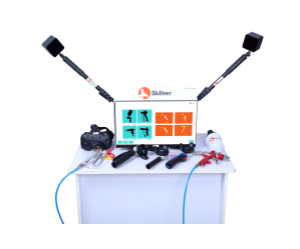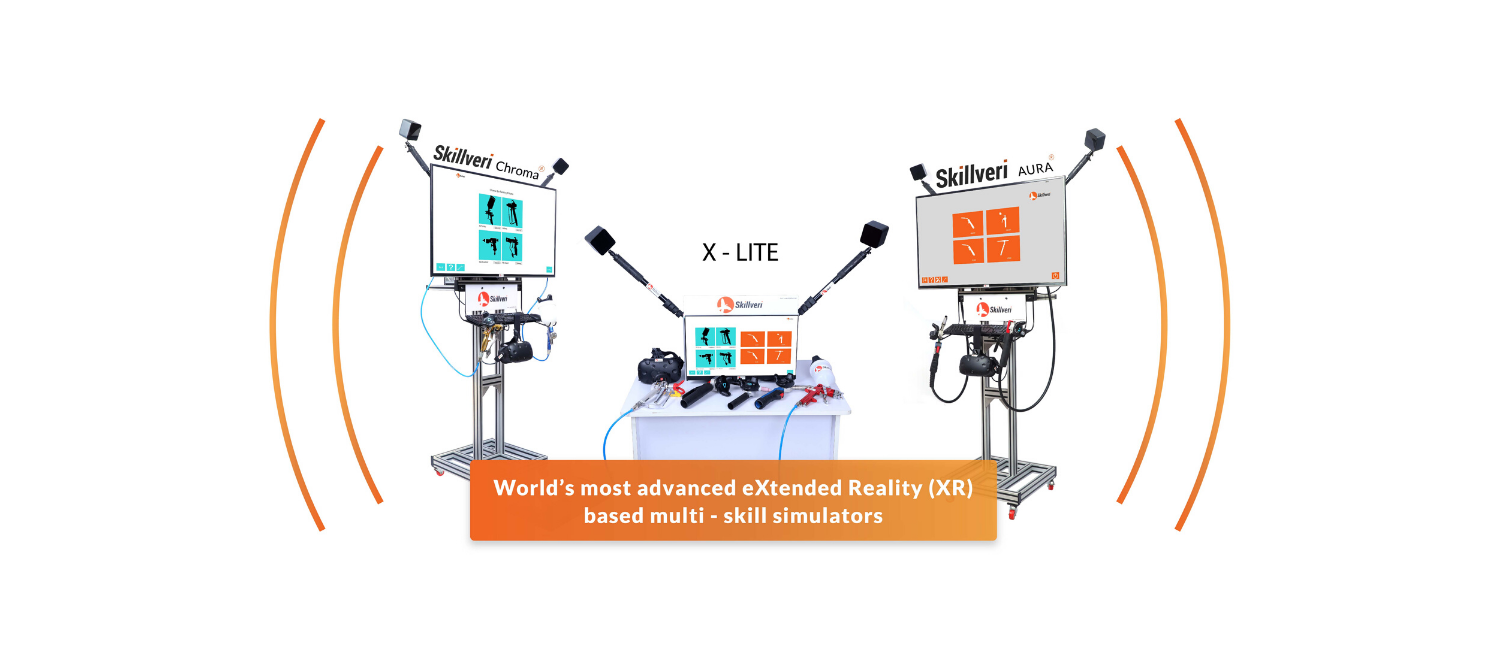While typical technical training institutes take about a year to upskill workers, Ankur Capital and Michael & Susan Dell Foundation-funded Skillveri has designed training simulators which can help welders pick up the skills within two or three weeks. With its R&D efforts focused on developing more such simulators in related fields, the founders are keen on taping India’s manufacturing sector with the hope that they can skill at least one lakh people for the 90 million jobs expected to be created in the next five years

As India gears up for ‘Make in India’, the need to upskill more workers to meet the increased demand has become mandatory. However, leading technical training institutes in India still run on outdated curriculum, and we still don’t have enough skilled workers for key manufacturing jobs.
Realizing this need-gap, in 2009-10, entrepreneur Kannan Lakshminarayanan approached his marketing head, Sabarinath C to find ways to tackle it. Sabarinath, during his research, realized that it was a specialized skill and India was hiring labor from China and Peru to meet its needs during metro construction. Meanwhile, Kannan, had even attempted to develop a prototype training module that was expensive and hence, had to be shelved.
By now, Sabarinath’s enthusiasm for this space grew, and he went on to identify people who were willing to develop a solution at a lower cost. Kannan, who eventually became his business partner, invited Sabarinath to use his existing business to start this new product line to avoid delays caused by formalities associated with registering a company. In 2012, the two were able to demonstrate the prototype to the welding community and assess its viability.
The existing training by ITI takes a year; typically, too long a period for young men who need to support their families. The tutorial from Skillveri, as the duo’s Chennai-based startup is called, can skill a welder for the job in two to three weeks.
Going to Market
The automotive industry was interested in the simulation-based training module, and by January 2014, the company started getting orders from customers who had experienced a trial version. Seeing the effectiveness of the product, customers also requested for a similar module for spray painting. However, Skillveri was bootstrapped at the time, and it needed the sales to strengthen its welding training module and build that market.
A seed fund of Rs. 75 lakhs from Ankur Capital in 2015 and then series A funding of Rs 8 crore from Ankur as well as Michael & Susan Dell Foundation helped push the company to the next level. Eventually, the company graduated from IIT Madras’ Rural Technology and Business Incubator (RTBI), and went on to receive the NSDC’s (National Skills Development Corporation) Innovation Award.
Skillveri’s simulator is based on psycho-physics principles, where both the mind and muscle skills are applied to the learning process. “Though the concept is not new, we used gaming technology to make it learner-driven. The existing simulators are machine-driven,” points out Sabarinath. In 2014, the company launched the module for training in one kind of welding. But since then, all types of welding have been covered by the modules.
While there is a potential for 50,000 welding simulators in the Indian market, one challenge the founders face is in changing the is the mindset of people. The initial sales were difficult but it was a learning experience for Sabarinath. “When I joined Vortex, the company I was working for earlier, at least 10 ATMs had been sold already and there was a demonstrable version available for reference. But here, we had to start from scratch,” he recollects.
“Over the years, the sales cycle has shorted and the existing buyers are also opting for repeat orders,” shares Sabainath. The company currently produces 20 simulators a month and is confident of being able to meet any increase in demand.
Though the concept is not new, we used gaming technology to make it learner-driven. The existing simulators are machine driven
The Next Step
For developing the welding tool, Sabarinath equipped himself with the technical skills needed to work with the development team, as well as sought welders to try it out through various stages. For developing the spray paint training simulator, the company has appointed a painting expert as a consultant. The beta is expected to be ready in four months, and the final release in seven. Since this is a customer-driven product, Sabarinath expects the market penetration to be easier.
There is another product on the anvil, and its development can be called serendipitous. When developing the module for spray paint, the company realized that it was getting very subjective feedback. To make it objective, it designed a tool with sensors to capture the actions of the learner. Over time, Skillveri realized that by connecting it to a mobile app via cloud, there was great potential to develop an IoT tool that can help painters correct their action for better effectiveness.
Another area the company is contemplating an entry into is jewellery soldering, which is similar to welding. The medical sector – laparoscopic surgery or epidural injections – is yet another area Skillveri wants to explore.
Market Development
Currently selling in India, Middle East, Southeast Asia and Eastern Africa, the company is looking for more involved channel partners. “Welding training has been happening from before, and hence, many consider this to be a good-to-have product rather than must-have,” Sabarinath points out. Only a channel partner who is able to dedicate time to highlight the benefits will be able to achieve considerable sales, and currently adding such partners is high priority.
With more products in its stable, he also expects that Skillveri will be looked at as a full-spectrum solution provider, thus improving its branding and market positioning. The company has hired welders and painters to provide training and help maintain the simulators to improve after-sales connectivity with its customers. Currently, the team is 26 people strong. R&D constitutes an important part of the company activity to identify new pain points in related sectors as well as track trends and suggest innovative solutions.
Vision and Growth
From Rs. 30 lakhs in 2014, the company’s sales has grown to Rs 2.2 crore last year and Sabarinath hopes to increase it to Rs. 6 crore this year. “Much is happening in hospitality and retail, but very little in manufacturing. About 90 million jobs are expected to be created in the next five years, of which we hope to be able to skill at least one lakh people,” says he.
He also shares his views on the attitude of some customers who prefer importing or import substitutions to buying an indigenously developed product. He hopes that this will change with time and encourage innovation and localized development more.
Blurb: “Though the concept is not new, we used gaming technology to make it learner-driven. The existing simulators are machine driven.”

Snapshot: Skillveri Training
Year: 2012
Founders : Sabarinath C & Kannan L
Focus: Simulators for welding and other skills training
Funded by: Ankur Capital, MSDF
Concept in Brief
Meeting the Skill Demand
While industrial technologies are undergoing rapid change, the technical training space is still lagging behind, making it necessary to bring in skilled laborers from outside the country, instead of tapping the resources within. Experiencing this shortage in the company they were working in, while also reading about the increasing need for such skilled workers, in the media, Sabarinath C and Kannan L decided to fill this skill gap by founding Skillveri, a company that creates a simulator that shortens the learning cycle effectively. The company received funding from Ankur Capital and Michael and Susan Dell Foundation, and was incubated at IIT Madras. Subsequently it has found clients across industries and geographies such as Middle East, South East Asia and East Africa. While strengthening its channel will be one focus area, it is also in the process of releasing a simulator for spray paint, and an IoT solution for painters to correct and improve their action. Skillveri envisions becoming a full spectrum solutions provider for industries (especially in the manufacturing space) and is exploring other solutions to work on.
